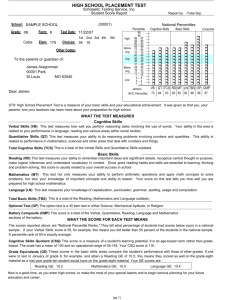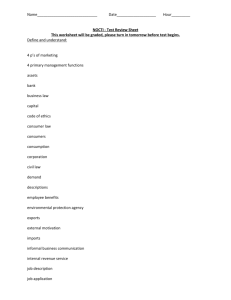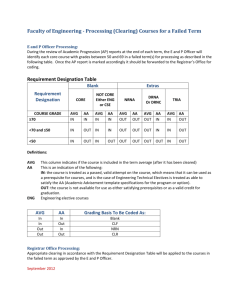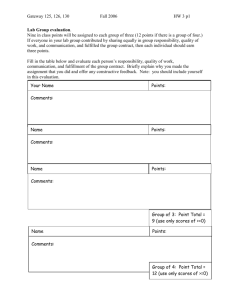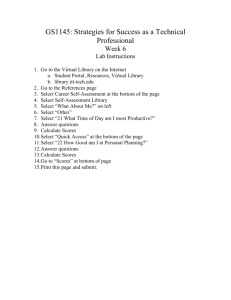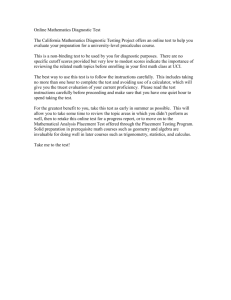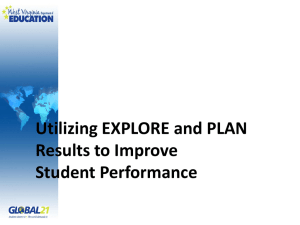Utilizing EXPLORE and PLAN Results to Improve Student
advertisement
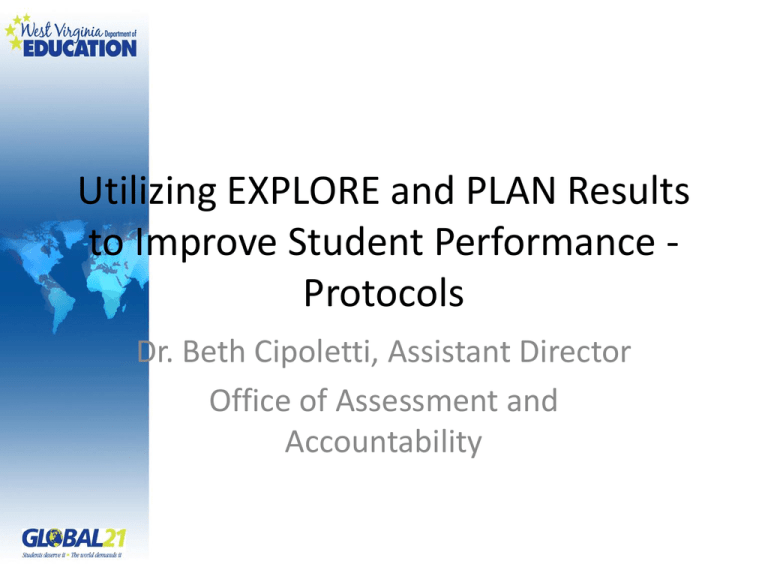
Utilizing EXPLORE and PLAN Results to Improve Student Performance Protocols Dr. Beth Cipoletti, Assistant Director Office of Assessment and Accountability Student Preparation • About 6,000 students drop out of high school every day. • More than one million students graduate each year from high school assuming they are ready for college or the workplace – and they are not. ACT, 2008. Making the Dream a Reality: Action Steps for States to Prepare All Students for College and a Career Student Preparation ALL graduates need the same knowledge and skills to be successful in – Two- or four-year college – Job that offers a career path at a selfsupporting wage – Apprenticeship or related training – Military ACT, 2008. Making the Dream a Reality: Action Steps for States to Prepare All Students for College and Career Student Preparation Students who take two or more remedial college courses are unlikely to graduate. – Nearly 45% who plan to go to college after graduation have not taken courses that will allow them to proceed to creditbearing, college courses. ACT, 2004. On Course for Success Protocol Development • Dr. Beth Cipoletti, Assistant Director, Office of Assessment and Accountability • Barbara Ashcraft, School Counselor Coordinator, Office of School Improvement • EXPLORE and PLAN Advisory Committee – County Test Coordinators – Middle and high school counselors and administrator • School Counselor Protocol Review Committee Student Score Reports • Plans for after high school • Scores compared to EXPLORE/PLAN College Readiness Benchmarks • Predicted PLAN/ACT composite score • Interest inventory response interpreted on World-of-Work Map • Responses and correct answers with suggestion for building knowledge and skills See Utilizing EXPLORE and PLAN Results, Appendix A, pp. 82-85; Appendix D, pp. 96-99. EXPLORE and PLAN Student Reports Page 1 Student Reports Reported Needs Student Reports College Readiness Estimated PLAN or ACT Scores Student Reports Career Area List Student Reports Page 2 EXPLORE PLAN Student Reports World-of-Work Map Resources ACT EXPLORE Student Website World-of-Work Map Using PLAN to Identify Students with AP Potential • Research findings released in 2009 • Relationship between students’ scores on PLAN and their scores on selected AP exams • PLAN test scores are good predictors of success in AP courses http://www.act.org/research/policymakers/p df/UsingPlan.pdf AP Courses Students who take AP courses – Gain skills that help them succeed in college • Writing and problem-solving skills • Study habits – Stand out in admission process • 31% of colleges and universities look at AP experience when determining scholarships – More likely to graduate in 4 years • Over 90% of 4-year colleges provide credit and/or advanced placement for qualifying scores PLAN Scores Associated with Selected AP Exam Scores PLAN Scores 3 or Higher AP Score 4 or Higher AP Score 50% 75% 50% 23 26 26.5 Avg. Mathematics & Science 22.5 25.5 25.5 Calculus BC Avg. Mathematics & Science 21 24.5 25 Chemistry Avg. Mathematics & Science 24.5 27.5 28 English Language and Compositions Avg. English & Reading 21.5 24 26 English Literature and Composition Avg. English & Reading 21.5 24 26.5 European History Avg. English & Reading 21.5 24.5 27 Government and Politics: Comparative Avg. English & Reading 22 25.5 26.5 Government and Politics: United States Avg. English & Reading 22.5 26 27 Macroeconomics Avg. Mathematics & Science 24 27.5 27 Microeconomics Avg. Mathematics & Science 22 26 26.5 Physics B Avg. Mathematics & Science 23.5 26.5 27 AP Exam Biology PLAN Tests Avg. Mathematics & Science Calculus AB PLAN: Predictions of AP Success School Roster • Lists students and identifies those who have potential to be successful in selected AP courses based upon their PLAN results and ACT’s research linking PLAN scores to success in AP courses PLAN: Predictions of AP Success School Roster Action Plan • What activities do you plan to initiate this year to implement the protocols? • What are your intended outcomes? • Who will participate in the activities? • When will you conduct these activities? • How will you evaluate the effectiveness of your work? Thank you For more information, contact • Dr. Beth Cipoletti dcipolet@access.k12.wv.us • Cathy Perry cgperry@access.wv.us • Lori Helmick lhelmick@access.k12.wv.us • Tammy Hobert Wells thwells@access.k12.wv.us • Michael Runner mrunner@access.k12.wv.us
